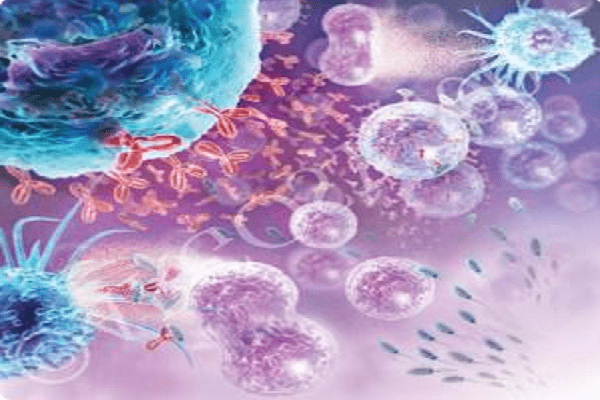Immunology and Allergology >>>> Clonal theory of immunity
Clonal theory of immunity.

The work of the immune system is one of the most complex biochemical processes, not only because it is carried out at the cellular level, but also because it is built on the phased involvement of various structures in the body's defense process. Despite the fact that the immune system, which has at its disposal various levers of activation of immune agents, is accustomed to cope with threats to the body itself, the study of the patterns of the immune system is necessary to predict the immune response as a method of treating almost all diseases of the body. But the mechanisms of the immune system are especially interesting in the field of problems of autoimmune reactions, when the immune system itself begins to pose a threat to the health of the body.
The developers of the theory of clonal selection, M. Burnet and D. Tolmage, who discovered the ability of lymphocytes to "recognize" their enemy (antigen is a foreign gene), were engaged in solving these issues. Since its discovery and development, the clonal theory of immunity has undergone many changes. Later, the mechanisms of differentiation of lymphocytes into B- and T-lymphocytes were discovered, but the essence of the selection - clonal theory of immunity is still relevant to this day:
- Lymphocytes (B and T) can recognize their enemy (antigen) due to the presence of specific receptors on the surface of the lymphocyte and specific, unique molecules on the surface of the antigen, which determine not only the foreignness of the antigen, but also its variety.
- After their birth in the thymus, lymphocytes undergo selection - a competition for the ability to receptor recognition of foreign antigens (including unique ones) and the ability to respond to their own unique protein structures (such lymphocytes are called autoreactive, and it is they who pose a threat to the body, as they provoke autoimmune reactions ). In the course of selection, autoreactive lymphocytes are mostly eliminated, and this ensures a stable immune system only to search for and neutralize foreign antigen proteins, and not their native protein structures. But only autoreactive T-lymphocytes are destroyed, not B-lymphocytes (which are produced by the bone marrow, and which further in the spleen and lymphatic system mature to the required state.) It is B-lymphocytes that can mislead the immune system.
- B-lymphocytes, reacting to an antigen, begin the process of proliferation (multiplication or cloning), which results in a large number of B-lymphocytes with the same properties: to produce antibodies (constructs that will destroy a foreign agent). In parallel with cloning, B-lymphocytes create specific complexes for T-lymphocytes, which, interacting with these complexes, also understand what substances need to be produced to neutralize the antigen, and in turn (to enhance the attack) also begin the cloning process, creating very large clusters of identical T lymphocytes to increase the concentration of antibodies at a specific site of antigen detection.
The clonal theory of the immunological response has been and continues to be developed as part of the work of adaptive immunity.
Adaptive immunity - one of the capabilities of the immune system - provides an invaluable service to the human body in its struggle to survive in a constantly changing hostile environment. Microorganisms mutate easily, but the human body, due to the complexity of its biological structure, cannot adapt as quickly to the attacks of surrounding harmful organisms, and for this purpose organs have been created that produce specific cells for various defense purposes. These cells - lymphocytes, are born the same, but in the course of their life path lymphocytes are endowed with different properties - they are differentiated. Some of them are converted into B-lymphocytes, some into T-lymphocytes. T-lymphocytes also differentiate: they turn into T-lymphocytes "helpers" and T-lymphocytes "killer".
How healthy the lymphocytes are, how much they are able to adapt to the capabilities of variable harmful microorganisms "pretend", how correctly they can identify ("recognize") the enemy (antigen), so specific, which means that the methods of influencing the immune system as a whole on such a foreign enemy will be effective.

Read

Read


























